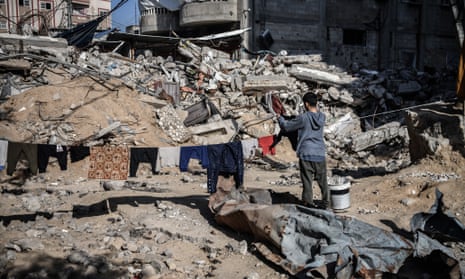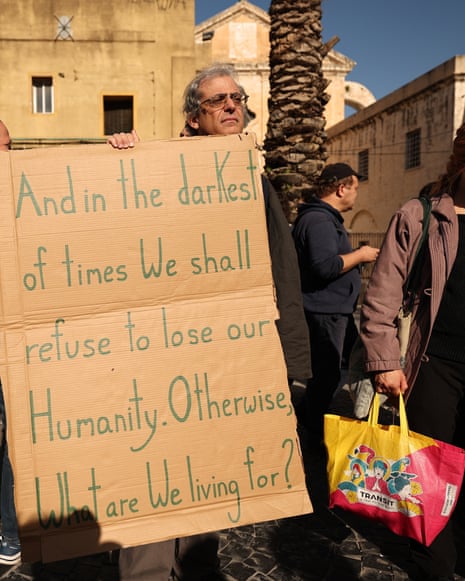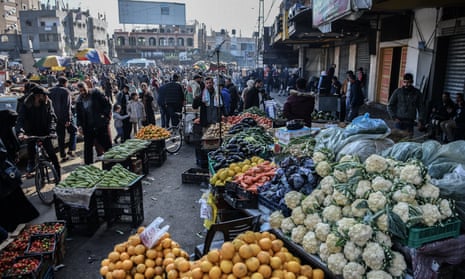Four Iranian Revolutionary Guards confirmed killed in Damascus airstrike
Iran has confirmed that four members of its Revolutionary Guards have been killed in Saturday’s missile strike on Damascus. Several members of Syrian armed forces were also killed, Iran’s Revolutionary Guards Corps (IRGC) said in a statement, reported by Al Jazeera:
Once more the criminal Zionist regime has moved to violate the city of Damascus, the Syrian capital, and during an airstrike by the fighter jets of the invading and occupying regime a number of Syrian forces and four military advisers of the Islamic Republic of Iran were martyred.”
Al Jazeera added that Iranian state television had called it a “terrorist” attack by Israel. The news organisation also reports that one of the IRGC killed was believed to be the head of the intelligence department of the Quds force, the most elite unit of the IRGC.
The Iranian state-owned news network, Press TV, published footage that it said showed the “extensive devastation” caused by the strike in the Mazzeh neighbourhood on Saturday:
Key events
Joe Biden said a two-state solution is still possible after a call with the Israeli prime minister, Benjamin Netanyahu, who previously publicly said that he rejects a Palestinian state.
The Guardian’s Jason Burke reports:
Joe Biden has said the creation of an independent state for Palestinians was still possible while Benjamin Netanyahu was still in office, following a call with the Israeli prime minister on Friday.
The US president spoke to Netanyahu for the first time in nearly a month about differences over a future Palestinian state, as well as Israel’s ongoing offensive in Gaza, where the Palestinian death toll is approaching 25,000, according to local health authorities.
Early on Saturday, witnesses reported further Israeli bombardment on Khan Younis, the largest city in Gaza’s south, although Palestinian media also reported intense fire around Jabalia in the north.
The leaders’ call came a day after Netanyahu said in a televised press conference in Israel that he had told US officials in plain terms that he will not support a Palestinian state as part of any postwar plan.
For the full story, click here:
Unicef communication specialist Tess Ingram has released a dispatch from Gaza, saying: “Humanity cannot allow this warped version of normal to persist any longer.”
Speaking from the Emirati hospital in Gaza, Ingram said:
The situation is very desperate. Some of the mother’s haven’t made it through giving birth.
Two mothers are killed every hour, the UN estimates, as Israeli strikes continue to destroy the Gaza strip, leaving nearly 2 million Palestinians displaced.
US personnel suffered minor injuries and a member of Iraq’s security forces was seriously wounded after an attack on Iraq’s Ain al-Asad airbase on Saturday, Reuters reports a US official saying.
Speaking anonymously, the official said that initial reports indicated that the base was struck by ballistic missiles but left open the possibility that it may have been hit by rockets.
Fifth Iran Revolutionary Guards member killed in Israeli strike in Syria
A fifth member of Iran’s Revolutionary Guards has been killed in an Israeli missile strike in Syria on Saturday, Reuters reports.
According to a Revolutionary Guards statement, Amin Samadi “fell as a martyr after being among those wounded in today’s Zionist terrorist crime in Damascus”.
Earlier on Saturday, the Revolutionary Guards confirmed that four guards were killed in the attack.
The Palestine Red Crescent Society teams helped evacuate five critically injured individuals from al-Shifa hospital to the European hospital in Khan Younis, southern Gaza on Saturday.
In a post on X, the PRCS added that seven more individuals were transported from Gaza City to the Rafah crossing to reunite with their families on the Egyptian side.
⭕️The Palestine Red Crescent teams, in coordination with the International Committee of the Red Cross, evacuated 5 critically injured individuals from Al-Shifa Hospital to the European Hospital in #KhanYounis today.
📌Additionally, seven citizens, including four children…— PRCS (@PalestineRCS) January 20, 2024
Summary
It is 6.05pm in Gaza City, Beirut and Tel Aviv, 7.05pm in Damascus and 7.35pm in Tehran. Here are the updates so far on Saturday:
-
Iran has condemned a missile strike that killed four members of its Revolutionary Guards in Damascus, Syria, on Saturday as a “desperate attempt to spread instability in region”. Iran has blamed Israel for the attack but there was no immediate comment from Israel. Foreign ministry spokesperson Nasser Kanaani said Iran “resreserves its right to respond”. Several members of Syrian armed forces were also killed in the airstrike on the Mazzeh neighbourhood.
-
Senior Hamas official, Izzat al-Rishq on Saturday dismissed comments by the US president, Joe Biden, about the possibility of Israel agreeing to the establishment of a Palestinian state, reports AFP. “Biden is a full partner in the genocidal war and our people do not expect any good from him,” he said. It comes after Biden and Netanyahu held their first call since 23 December and discussed a postwar future for Palestinians which have suggested a rift between the two allies.
-
Israel’s president, Benjamin Netanyahu, has appeared to push back against US president Joe Biden’s remarks about Palestinian statehood after the war against Hamas in Gaza ends in a statement published by his office on Saturday. Asked to clarify whether Netanyahu was opposed to any kind of Palestinian statehood, his office did not immediately respond.
-
An Israeli strike on southern Lebanon on Saturday killed two members of the Palestinian militant group Hamas as they were traveling in a car, three security sources in Lebanon told Reuters.
-
Iran’s IRGC commanders and Lebanon’s Hezbollah group are on the ground in Yemen helping to direct and oversee Houthi attacks on Red Sea shipping, four regional and two Iranian sources told Reuters. Kanaani had repeatedly denied Tehran is involved in the Red Sea attacks by the Houthis, while the Houthi spokesperson Mohammed Abdulsalam denied any Iranian or Hezbollah involvement in helping to direct the Red Sea attacks.
-
Israel pounded targets across the Gaza Strip on Saturday while its planes dropped leaflets on the southern area of Rafah urging Palestinians seeking refuge there to help locate hostages held by Hamas.
-
Palestinian fighters battled tanks trying to push back into the eastern suburbs of the Jabalia area in northern Gaza, where Israel had started pulling out troops and shifting to smaller-scale operations.
-
In the southern area of Khan Younis, where Israel says it has expanded its operations against Hamas, witnesses said tanks shelled areas around Nasser hospital overnight, describing the bombardment as the most intense in many days. The Israeli military said that in Khan Younis, it raided a military compound, neutralised ready-to-use rocket launchers and found explosives stashed underground while an aircraft struck two gunmen there.
-
Dozens of protesters gathered outside the residence of the Israeli prime minister, Benjamin Netanyahu, on Friday night, calling for the immediate release of all hostages kidnapped during the Hamas attack on 7 October.
-
At least 22 Palestinians, including a woman and children, were arrested overnight in occupied West Bank by Israeli forces. The Palestinian Prisoners Club said the arrests were carried out in Hebron, Nablus, Tubas, Bethlehem, Jenin and Jerusalem.
-
The Palestinian Red Crescent Society (PRCS) has said the humanitarian situation in northern Gaza “remains dire”, with people returning to “primitive methods for food preparation and general hygiene”. It also said the situation had been “exacerbated by the continuous Israeli blockade hindering aid delivery”.
-
Two Palestinians were killed and several others injured in an Israeli bombing of the al-Amal neighbourhood in the city of Khan Younis, bringing the number of victims of shelling in several areas in the city since dawn on Friday to 18 dead and dozens wounded.
-
The Cyprus government is facing growing criticism over British military bases on the island being used by UK and US forces to stage airstrikes on Iran-backed Houthi rebels in Yemen.
-
The UK’s shadow foreign secretary, David Lammy, has described Benjamin Netanyahu’s opposition to the establishment of a Palestinian state when the war in Gaza ends as “unacceptable”. In an interview with BBC Radio 4’s Today programme on Saturday, he said: “We are committed to the recognition of a Palestinian state. We want to work with international partners to achieve that.”
-
Ashraf al-Qudra, the spokesperson for the Hamas-run health ministry in the Gaza Strip, told Al Jazeera that Israel had targeted the healthcare system since the very beginning of the war on 7 October and that aid entering the area “does not meet basic health needs”.
-
The latest figures from the Gaza health ministry, which is run by Hamas, said 165 Palestinians were killed in Israeli strikes and 280 injured in the past 24 hours.
Iran condemns deadly strike on Syria and says it ‘reserves right to respond’
Iran’s foreign ministry condemned a missile strike that killed four members of its Revolutionary Guards in Syria on Saturday as a “desperate attempt to spread instability in region”, reported Reuters, citing Iranian state media. Iran has blamed Israel for the attack but there was no immediate comment from Israel, reported Reuters.
“Iran … reserves its right to respond to the organised terrorism of the fake Zionist regime at the appropriate time and place,” the foreign ministry spokesperson, Nasser Kanaani, was quoted by state media as saying. He also urged foreign countries and international organisations to condemn the attack.
AFP reported that Kanaani decried “frequent violations of Syria’s sovereignty and territorial integrity and an escalation in aggressive and provocative attacks” by Israel.
Iran’s IRGC commanders and Lebanon’s Hezbollah group are on the ground in Yemen helping to direct and oversee Houthi attacks on Red Sea shipping, four regional and two Iranian sources told Reuters.
Iran, which has armed, trained and funded the Houthis, stepped up its weapons supplies to the militia as a result of the war in Gaza, which erupted after the Iranian-backed militants Hamas attacked Israel on 7 October, the four regional sources said.
Tehran has provided advanced drones, anti-ship cruise missiles, precision-strike ballistic missiles and medium-range missiles to the Houthis, who started targeting commercial vessels in November in solidarity with Palestinians in Gaza, the sources told Reuters.
IRGC commanders and advisers are also providing knowhow, data and intelligence support to determine which of the dozens of vessels travelling through the Red Sea each day are destined for Israel and constitute Houthi targets, all the sources said.
“The Revolutionary Guards have been helping the Houthis with military training (on advanced weapons),” an Iranian insider told Reuters. “A group of Houthi fighters were in Iran last month and were trained in an IRGC base in central Iran to get familiar with the new technology and the use of missiles.”
The person said Iranian commanders had travelled to Yemen as well and set up a command centre in the capital Sana’a for the Red Sea attacks which is being run by the senior IRGC commander responsible for Yemen.”
Washington said last month that Iran was deeply involved in planning operations against shipping in the Red Sea and that its intelligence was critical to enable the Houthis to target ships.
In response to a request for comment by Reuters, the White House pointed to its previous public comments about how Iran had been supporting the Houthis.
In his weekly news conferences, Iran’s foreign ministry spokesperson, Nasser Kanaani, had repeatedly denied Tehran is involved in the Red Sea attacks by the Houthis. The IRGC public relations office did not respond to Reuters’ request for comment.
The Houthi spokesperson, Mohammed Abdulsalam, denied any Iranian or Hezbollah involvement in helping to direct the Red Sea attacks. A Hezbollah spokesperson did not respond to a request by Reuters for comment.
Aid entering Gaza ‘does not meet basic health needs’, says health ministry
Ashraf al-Qudra, the spokesperson for the Hamas-run health ministry in the Gaza Strip, has told Al Jazeera that Israel has targeted the healthcare system since the very beginning of the war on 7 October and that aid entering the area “does not meet basic health needs”.
“The aid entering the Gaza Strip does not meet basic health needs,” he said. “We try to differentiate between cases among the wounded and sick to save who we can.”
He added that Israel controls the mechanism for the exit of patients who urgently require medical treatment outside the Gaza Strip.
On Friday, Unicef described the Gaza Strip as “the most dangerous place in the world to be a child”. Its deputy executive director, Ted Chaiban, said in statement released after visiting the area in regards to aid that Unicef was “trying to drip assistance through a straw to meet an ocean of need”. He said:
Before the conflict more than 500 trucks entered the Gaza Strip every day. When I was there in November, about 60 aid trucks a day entered. Now, it is about 130 trucks a day alongside an average of 30 commercial trucks a day. This is with the opening of a second crossing point but it still remains wholly inadequate. We are trying to drip assistance through a straw to meet an ocean of need.
The charity ActionAid UK, on Friday criticised the “confusing and arbitrary rules about the type of aid permitted to enter Gaza”. The charity said this had resulted in thousands of essential items being stopped at border crossings and prevented from reaching those who desperately need it, as well as increasing the time spent on screening trucks, leading to a backlog at the border.
Here are the latest images coming across the wires from Gaza and Israel:




Cyprus faces backlash over use of British bases to bomb Houthis
Helen Smith
The Cyprus government is facing growing criticism over British military bases on the island being used by UK and US forces to stage airstrikes on Iran-backed Houthi rebels in Yemen.
President Nicos Christodoulides has been accused by activists of turning a blind eye to the risks the EU’s most easterly state might confront if the strategic facilities on the island continue to be used in military operations.
The Guardian has learned that both the US ambassador and British high commissioner briefed the Cypriot president of imminent military action in Yemen before the first round of airstrikes last week.
“There are ever more war planes taking off every day,” Tassos Costeas, a prominent Greek Cypriot peace activist, said. “The dangers of Cyprus becoming a target are evident.”
The UK’s shadow foreign secretary, David Lammy, has described Benjamin Netanyahu’s opposition to the establishment of a Palestinian state when the war in Gaza ends as “unacceptable”.
In an interview with BBC Radio 4’s Today programme on Saturday, he echoed Keir Starmer’s reaction to the Israeli prime minister’s stance. Lammy said: “We are committed to the recognition of a Palestinian state. We want to work with international partners to achieve that.”
He said the US president, Joe Biden, was right to have committed to working towards helping the Palestinians move towards statehood.
“And I have to say, I think Netanyahu’s words were unacceptable,” he added. “Of course, the Palestinian people deserve a state, and if they don’t, the consequence of that is either one state in which Benjamin Netanyahu would have to explain how Palestinians and Israelis live side by-side with equal rights, or no state, in which what he is really saying is occupation, and siege continues.”
Benjamin Netanyahu has appeared to push back against Joe Biden’s remarks about Palestinian statehood after the war against Hamas in Gaza ends.
The US president said on Friday he had spoken with the Israeli prime minister about possible solutions for the creation of an independent Palestinian state, suggesting one path could involve a non-militarised government.
A statement from Netanyahu’s office on Saturday said:
In his conversation with President Biden, Prime Minister Netanyahu reiterated his policy that after Hamas is destroyed Israel must retain security control over Gaza to ensure that Gaza will no longer pose a threat to Israel, a requirement that contradicts the demand for Palestinian sovereignty.
Asked to clarify whether Netanyahu was opposed to any kind of Palestinian statehood, his office did not immediately respond.
Biden’s call with Netanyahu was the first in nearly a month, the White House said. Asked if a two-state solution was “impossible” while Netanyahu was in office, Biden said: “No, it’s not.”
He said Netanyahu was not opposed to all two-state solutions, and there were a number of types possible.
Netanyahu has stopped short of outright and explicit rejection of Palestinian statehood. But on Thursday he said that in the foreseeable future:
With an accord or without an accord, Israel must have security control over the entire territory west of the Jordan River. That’s a necessary condition. It clashes with the principle of sovereignty but what can you do.”
US-backed peace talks towards the two-state solution, which would involve Israel existing next to a Palestinian state in Gaza, the West Bank and East Jerusalem, collapsed a decade ago.


I thought you did a great job on this. Although your language is excellent and the picture is enticing, you come across as nervous about what you might be giving next. If you save this walk, I hope you will come back here often.